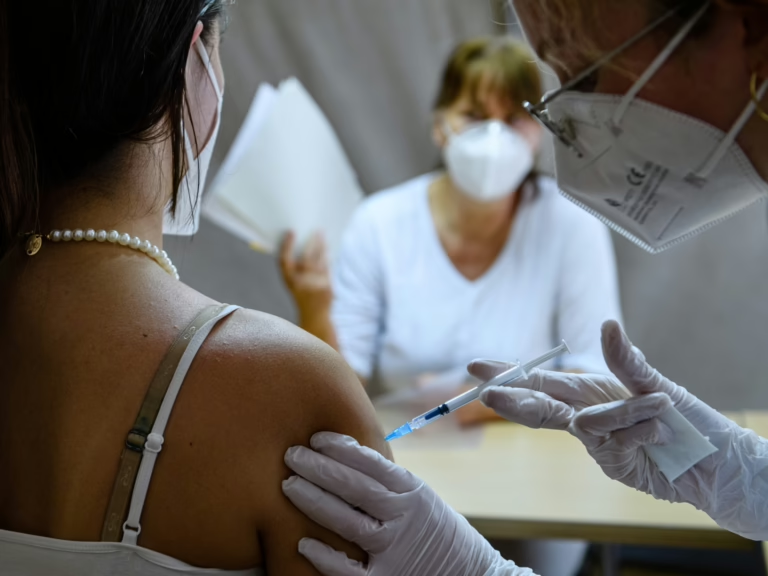Recently, a study from South Korea has been widely misinterpreted online, with claims asserting it “proves” that COVID-19 vaccines increase the risk of up to six different cancers. This misinformation rapidly spread, bolstered by influential individuals and platforms leveraging their professional reputations to give these assertions unwarranted credibility.
How did this misleading narrative gain traction?
Who propagated the claim linking vaccines to cancer?
On social media, users referenced a research article titled “1-year risks of cancers associated with COVID-19 vaccination: a large population-based cohort study in South Korea,” published in the open-access journal Biomarker Research. The investigation analyzed data from South Korea’s national health insurance system and observed a statistical pattern: vaccinated individuals appeared more frequently diagnosed with certain cancers within a year. However, this correlation was erroneously presented as conclusive evidence of causation.
This misinformation campaign strategically highlighted alarming statistics to provoke fear, with some prominent figures amplifying the message by citing their medical or scientific credentials.
For example, the media outlet Vigilant Fox, which describes itself as a “healthcare specialist turned independent journalist” founded company, promoted the study by claiming a 27% overall increase in cancer risk post-vaccination. They further exaggerated specific cancer risks, citing a 53% rise in lung cancer and a 69% increase in prostate cancer diagnoses.
COVID vaccines linked to a 27% INCREASE in overall cancer risk, South Korean study finds.
“There’s a one in a thousand chance that this result arose by chance,” Dr. John Campbell noted.@ChildrensHD reports:
The study used data from 2021-2023 for over 8.4 million people in… pic.twitter.com/kDZ56rCV6w
– Vigilant Fox 🦊 (@VigilantFox) October 6, 2025
Nicolas Hulscher, MPH, who identifies as an epidemiologist, escalated the misinformation by falsely asserting that the vaccine raises the risk of “seven types of cancer,” linking this study with others without scientific basis to claim significant increases across all these cancers.
🚨COVID-19 “Vaccines” Increase Your Risk of SEVEN Cancer Types
2 Landmark Studies tracked 8.7 MILLION people in Italy and South Korea – comparing vaccinated vs unvaccinated.
Breast, bladder, lung, prostate, thyroid, gastric, and colorectal cancers ALL surged after vaccination. https://t.co/M03HJoUZOu pic.twitter.com/txQF0HRKIY
– Nicolas Hulscher, MPH (@NicHulscher) October 6, 2025
Further endorsement came from Peter A. McCullough, MD, PhD, whose tweet supporting these claims garnered over half a million views, and Dr. Aseem Malhotra, a cardiologist and activist, who described the study as “important and concerning,” lending undue medical authority to the unfounded allegations.
BREAKING: Large Population Study Finds COVID-19 Vaccines Increase Risk of 6 Major Cancers
South Korea study of 8.4 million adults finds higher risks of overall, lung, prostate, thyroid, gastric, colorectal, and breast cancers – across both mRNA and viral-vector platforms.… pic.twitter.com/2PLFn6u9HQ
– Peter A. McCullough, MD, MPH® (@P_McCulloughMD) September 28, 2025
I’m afraid one of Britain’s most eminent oncologists Professor Angus Dalgleish may well be right on the covid ‘vaccines’ fuelling cancer. This study published in a very respected high impact journal is significant and concerning https://t.co/oCc3zmovv1 pic.twitter.com/4fxSQtu7rQ
– Dr Aseem Malhotra (@DrAseemMalhotra) September 28, 2025
Moreover, the Children’s Health Defense organization, known for its campaigns against childhood health issues, adopted this misleading narrative, publishing a report titled “All COVID Vaccines Increase Cancer Risk, New Study Concludes.”
Where did the misinterpretation arise?
Sanad, Al Jazeera’s fact-checking unit, reviewed the original research and found that those spreading misinformation deliberately omitted a crucial phrase from the study’s excerpts: “epidemiological association without causal relationship.”
In scientific language, an “epidemiological association” refers to a statistical link or pattern observed between two variables, but it does not imply that one causes the other.
To put this into perspective, consider that both ice cream sales and shark attacks increase during summer months. While these events correlate epidemiologically, it would be incorrect to conclude that ice cream consumption causes shark attacks; instead, warmer weather drives both phenomena.
The distortion happens when this correlation is falsely presented as proof of causation, a mistake made by the influencers who ignored the study’s explicit caution and claimed vaccines “increase cancer risk.”
A more plausible explanation is “surveillance bias”: individuals who choose vaccination often engage more actively with healthcare services, leading to earlier detection of cancers through routine screenings rather than the vaccine causing the disease.
What were the actual conclusions of the South Korean study?
Contrary to the viral claims, the researchers clearly acknowledged the study’s limitations and explicitly refrained from asserting any causal link between vaccination and cancer.
In their final remarks, the authors stated: “Given the limited availability of real-world data, our population-based cohort study in Seoul, South Korea suggested epidemiological associations between the cumulative incidence of cancers and COVID-19 vaccination, which varied by sex, age and vaccine type. However, further studies are warranted to elucidate potential causal relationships, including the underlying molecular mechanisms related to COVID-19 vaccine-induced hyperinflammation.”
This statement underscores that the findings were limited to observed associations and that additional research is necessary to explore any causal mechanisms. Therefore, claims that vaccines “cause” cancer are a clear misrepresentation of the study’s findings.
Is there credible evidence that COVID-19 vaccines cause cancer?
No credible scientific evidence supports the notion that COVID-19 vaccines cause cancer. Leading global health authorities and scientific communities have consistently affirmed the vaccines’ safety profiles and rejected any causal connection to cancer.
For example, experts from the British Medical Journal (BMJ) have stated that no data link mRNA vaccines to cancer, highlighting that worldwide epidemiological surveillance has not detected any increase in cancer incidence following vaccination campaigns.
The Global Vaccine Data Network (GVDN) has dismissed the idea of a vaccine-induced “cancer epidemic” as biologically implausible, emphasizing that mRNA vaccines do not contain live virus particles nor integrate into the cell nucleus, making cancer causation impossible based on current biological understanding.
Additionally, research from the Fox Chase Cancer Center confirmed that mRNA vaccines are safe for cancer patients undergoing treatment, with side effects comparable to those experienced by the general population. Blood Cancer UK also encourages patients to continue receiving recommended vaccinations, noting the absence of any large-scale, controlled studies indicating increased cancer risk post-vaccination.
Finally, the U.S. National Cancer Institute has affirmed that “there is no evidence that COVID-19 vaccines cause cancer or lead to its recurrence or progression.” Thus, any assertion that COVID-19 vaccines induce cancer is a distortion of scientific evidence and epidemiological data.






















